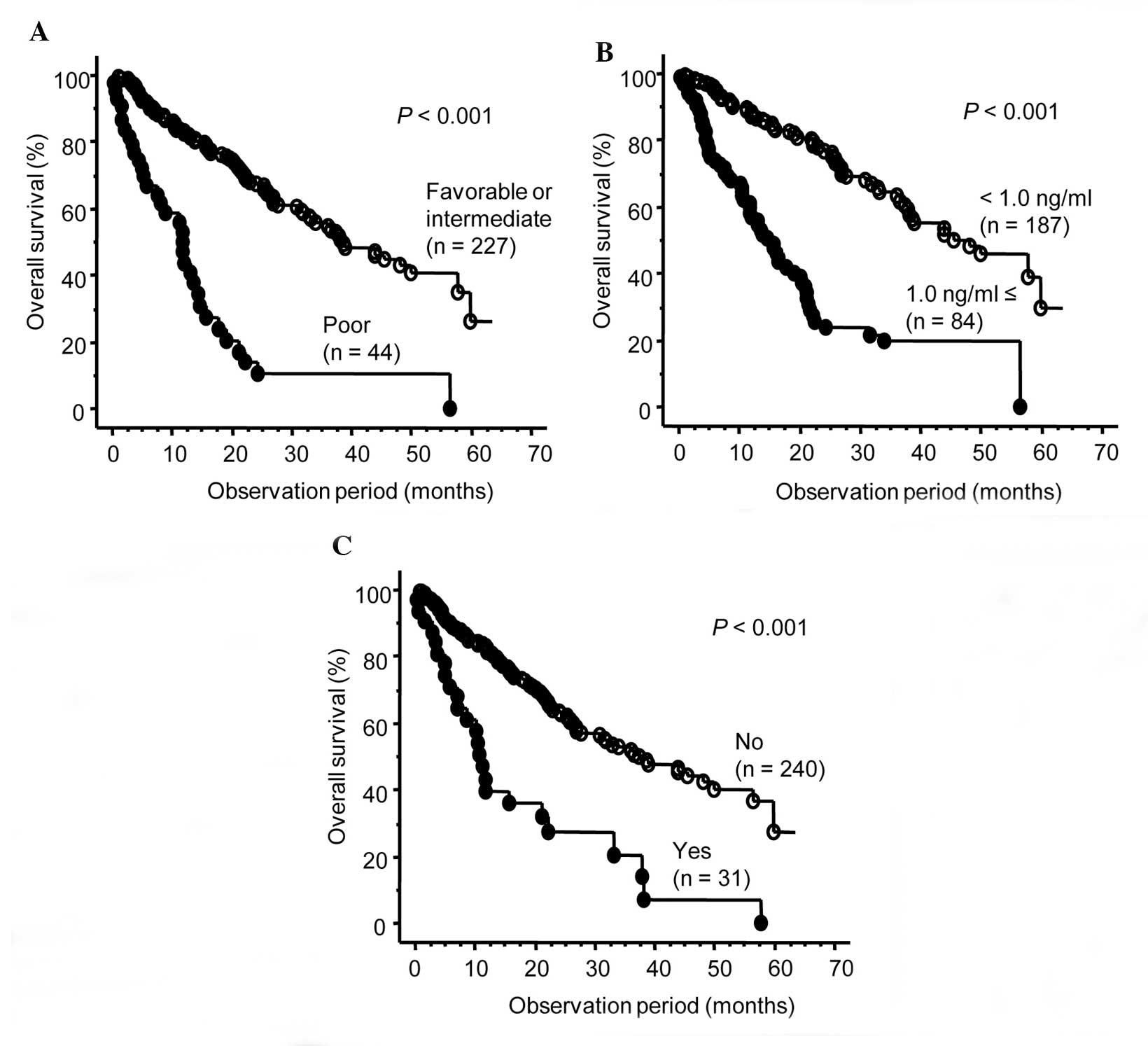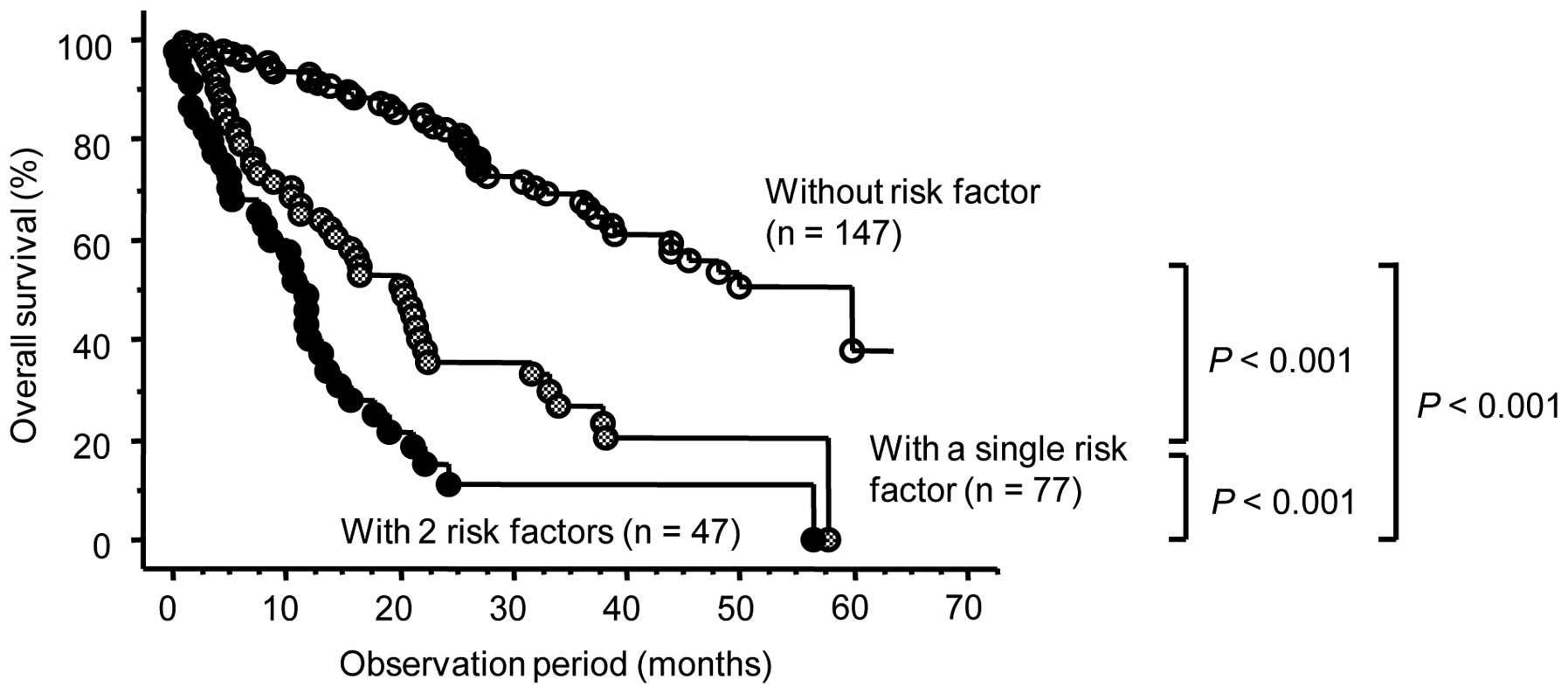|
1
|
Parton M, Gore M and Eisen T: Role of
cytokine therapy in 2006 and beyond for metastatic renal cell
cancer. J Clin Oncol. 24:5584–5592. 2006. View Article : Google Scholar : PubMed/NCBI
|
|
2
|
Figlin R, Sternberg C and Wood CG: Novel
agents and approaches for advanced renal cell carcinoma. J Urol.
188:707–715. 2012. View Article : Google Scholar : PubMed/NCBI
|
|
3
|
Escudier B, Eisen T, Stadler WM, et al:
Sorafenib in advanced clear-cell renal-cell carcinoma. N Engl J
Med. 356:125–134. 2007. View Article : Google Scholar : PubMed/NCBI
|
|
4
|
Motzer RJ, Hutson TE, Tomczak P, et al:
Sunitinib versus interferon alfa in metastatic renal-cell
carcinoma. N Engl J Med. 356:115–124. 2007. View Article : Google Scholar : PubMed/NCBI
|
|
5
|
Rini BI, Escudier B, Tomczak P, et al:
Comparative effectiveness of axitinib versus sorafenib in advanced
renal cell carcinoma (AXIS): a randomised phase 3 trial. Lancet.
378:1931–1939. 2011. View Article : Google Scholar : PubMed/NCBI
|
|
6
|
Motzer RJ, Hutson TE, Cella D, et al:
Pazopanib versus sunitinib in metastatic renal-cell carcinoma. N
Engl J Med. 369:722–731. 2013. View Article : Google Scholar : PubMed/NCBI
|
|
7
|
Patard JJ, Pignot G, Escudier B, et al:
ICUD-EAU International Consultation on Kidney Cancer 2010:
treatment of metastatic disease. Eur Urol. 60:684–690. 2011.
View Article : Google Scholar : PubMed/NCBI
|
|
8
|
Gore ME, Szczylik C, Porta C, et al:
Safety and efficacy of sunitinib for metastatic renal-cell
carcinoma: an expanded-access trial. Lancet Oncol. 10:757–763.
2009. View Article : Google Scholar : PubMed/NCBI
|
|
9
|
Harshman LC, Xie W, Bjarnason GA, et al:
Conditional survival of patients with metastatic renal-cell
carcinoma treated with VEGF-targeted therapy: a population-based
study. Lancet Oncol. 13:927–935. 2012. View Article : Google Scholar : PubMed/NCBI
|
|
10
|
Beck J, Procopio G, Bajetta E, et al:
Final results of the European Advanced Renal Cell Carcinoma
Sorafenib (EU-ARCCS) expanded-access study: a large open-label
study in diverse community settings. Ann Oncol. 22:1812–1823. 2011.
View Article : Google Scholar : PubMed/NCBI
|
|
11
|
Heng DY, Xie W, Regan MM, et al:
Prognostic factors for overall survival in patients with metastatic
renal cell carcinoma treated with vascular endothelial growth
factor-targeted agents: results from a large, multicenter study. J
Clin Oncol. 27:5794–5799. 2009. View Article : Google Scholar : PubMed/NCBI
|
|
12
|
Choueiri TK, Duh MS, Clement J, et al:
Angiogenesis inhibitor therapies for metastatic renal cell
carcinoma: effectiveness, safety and treatment patterns in clinical
practice-based on medical chart review. BJU Int. 105:1247–1254.
2010. View Article : Google Scholar : PubMed/NCBI
|
|
13
|
Miyake H, Miyazaki A, Harada K, et al:
Assessment of efficacy, safety and quality of life of 110 patients
treated with sunitinib as first-line therapy for metastatic renal
cell carcinoma: experience in real-world clinical practice in
Japan. Med Oncol. 31:9782014. View Article : Google Scholar : PubMed/NCBI
|
|
14
|
Motzer RJ, Bacik J, Murphy BA, et al:
Interferon-alfa as a comparative treatment for clinical trials of
new therapies against advanced renal cell carcinoma. J Clin Oncol.
20:289–296. 2002. View Article : Google Scholar : PubMed/NCBI
|
|
15
|
Ainsworth NL, Lee JS and Eisen T: Impact
of anti-angiogenic treatments on metastatic renal cell carcinoma.
Expert Rev Anticancer Ther. 9:1793–1805. 2009. View Article : Google Scholar : PubMed/NCBI
|
|
16
|
You D, Jeong IG, Ahn JH, et al: The value
of cytoreductive nephrectomy for metastatic renal cell carcinoma in
the era of targeted therapy. J Urol. 185:54–59. 2011. View Article : Google Scholar : PubMed/NCBI
|
|
17
|
Beuselinck B, Vano YA, Oudard S, et al:
Prognostic impact of baseline serum C-reactive protein in patients
with metastatic renal cell carcinoma (RCC) treated with sunitinib.
BJU Int. 114:81–89. 2014. View Article : Google Scholar : PubMed/NCBI
|
|
18
|
Kwon WA, Cho IC, Yu A, et al: Validation
of the MSKCC and Heng risk criteria models for predicting survival
in patients with metastatic renal cell carcinoma treated with
sunitinib. Ann Surg Oncol. 20:4397–4404. 2013. View Article : Google Scholar : PubMed/NCBI
|
|
19
|
Miyake H, Kusuda Y, Harada K, et al:
Third-line sunitinib following sequential use of cytokine therapy
and sorafenib in Japanese patients with metastatic renal cell
carcinoma. Int J Clin Oncol. 18:81–86. 2013. View Article : Google Scholar : PubMed/NCBI
|
|
20
|
Hudes G, Carducci M, Tomczak P, et al:
Temsirolimus, interferon alfa, or both for advanced renal-cell
carcinoma. N Engl J Med. 356:2271–2281. 2007. View Article : Google Scholar : PubMed/NCBI
|

















